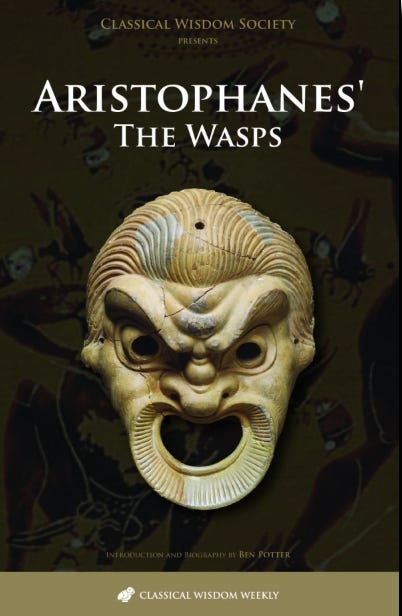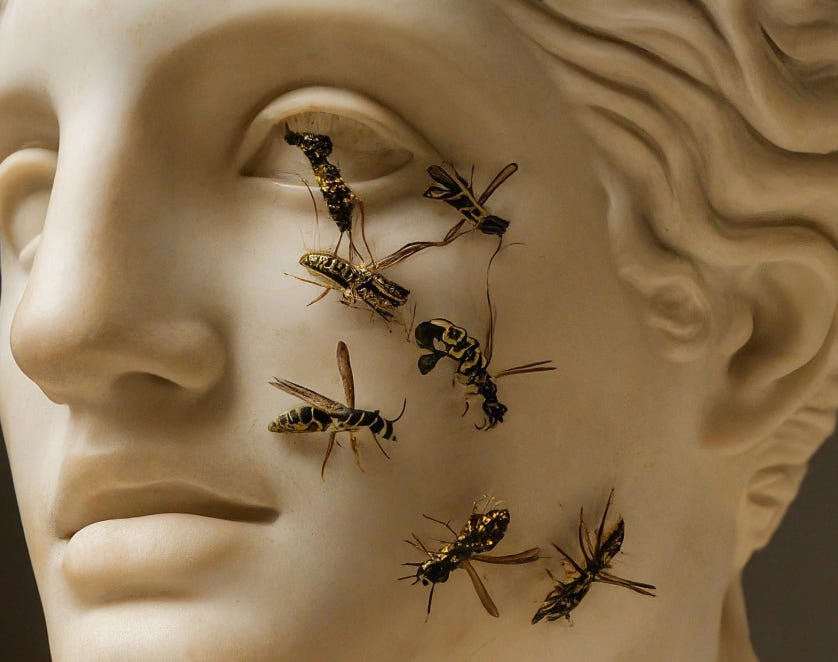Dear Classical Wisdom Member,
Comedy can be a very serious business. Sure, it’s meant to inspire a laugh, allow a temporary escape from drudgery or entertain with a clever play on words... but there is also a long and storied history of comics laying down some hard truths.
Recall the jesters in medieval courts around Europe, brightly dressed and cheerfully singing, all while poking fun at either church or state, their criticisms, carefully dressed in humour and joviality. In Russia, the Skomorokhi were the only ones allowed to be critical of the Tsars and their entourage, because they delivered such messages with either a zither or a convenient pinch of insanity.
Going back to the ancient world likewise we find important historical commentary–as well as scathing opinions–about those in power by those with a sense of humor. Indeed, it was a rich tradition filled with Greeks and Romans alike. Take, for instance, the roman poet Juvenal (c. 55–140 CE) who coined the still apt term of “bread and circuses” or Horace (65–8 BCE), whose satires often explored the follies and vices of Roman society.
There was Martial (c. 40–104 CE), known for his biting epigrams and Cratinus (c. 519–422 BCE), who cleverly depicted himself as being controlled by wine while lampooning political figures.
The predecessor of all of these satirists, however, is none other than Aristophanes, the “Father” of Old Comedy.
His contributions to this important field are beyond compare...Especially his most ambitious piece, The Wasps (422 BC). Considered to be Aristophanes' most biting social commentary and earliest examples of political satire, it is a brilliant tactic to sting the then current Athenian demagogue, Cleon...as well the rampant use (dare I say ‘weaponization’) of the law courts within ancient Athenian society.
Once more illustrating that there isn’t anything new under the sun, his observations of those in power who abuse their positions through the legal system is as relevant as always...and he delivers this searing message with his carefully crafted comedy, of which you can learn about in today’s article.
Classical Wisdom Members, please enjoy the full introduction to The Wasps, below.
Also included today is our Ebook which includes the original text, a biography of Aristophanes as well as a very handy key to understanding some of the important themes and characters found in Old Comedy. Simply scroll down to access it all.
Aristophanes’s legacy is also a very worthwhile reminder that no matter who is in control, we should foster and encourage a healthy dose of criticism–and accountability–of those leading the charge.
…And if we can do it with a chuckle or a chortle, all the better.
So whether you’re crying into your cups or raising them in celebrations this week, remember to take a step back and laugh at them all...
All the best,
Anya Leonard
Founder and Director
Classical Wisdom
P.S. If you aren’t a member, but would like to access all of our resources, including our extensive Ebook library (with today’s ebook The Wasps), Podcasts with Professors and our Magazine archives, make sure to subscribe!
Next week we’ll have an in-depth article on Fulvia, one of the most important women of the Roman Republic. Instrumentally positioned inside the most prestigious family and intricately involved with the fall of the Republic and the rise of the Empire, Fulvia’s involvement is both understated and under appreciated... but who was the woman once married to Mark Antony who demanded the head of Cicero? Find out next week...
The Wasps: An Introduction
By Ben Potter
The ancient Athenian comedians, unfortunately, are often overlooked when compared to their dramatic counterparts. But they deserve more attention than they are generally given... and this is certainly true in the case of the master of Old Comedy, Aristophanes.
To call this outstanding talent 'the master' is self-evident, as Aristophanes is actually the only extant example we have of Old Comedy. This should not diminish him, however, as it is widely assumed he was the foremost executioner of the art form.
His eleven extant works make up an important historical, artistic and comedic oeuvre, each one worthy of scrutiny and contemplation. But if one wished to know the best starting point into the world of this (literally) exceptional scribe, then one would be hard-pressed to look further than The Wasps.
The Wasps (422 BC) is not merely deemed to be Aristophanes' most biting social commentary as well as his most ambitious piece, but is also thought to be the best exemplar of how a traditional Old Comedy was structured. It is also extremely funny to boot.
However, due to the ubiquity of scathing in-jokes in this slanderous, hysterical and, sometimes base production, it is necessary to know a little about the social and political background to The Wasps.
The primary target of Aristophanes' satirical ire was the chief demagogue of the time, Cleon. In fact, Cleon is one of Aristophanes' favourite topics, having lampooned him in two previous productions, The Knights (424 BC) and Peace (423 BC).
The aristocratic Cleon had shot to popularity following the Battle of Sphacteria in 425 BC. This crushing defeat of the Spartan forces (briefly) tipped the balance of the Peloponnesian War in favour of the Athenians.
However, the adulation the triumphant commander inevitably received told only half the story of Cleon's popularity; the other half was what inflamed Aristophanes' satirical wrath. Although the Athenian system did not allow for any one man to hold true power, Cleon cemented his position as the pre-eminent politician of the 420's by two means: 'bribery' and sycophancy.
Both of these he did through the might of the Athenian law-courts.
Specifically…
Keep reading with a 7-day free trial
Subscribe to Classical Wisdom to keep reading this post and get 7 days of free access to the full post archives.






